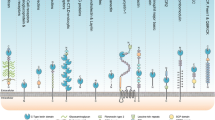Abstract
C-type lectin receptors (CLRs) are a group of pattern recognition receptors (PRRs) that recognize carbohydrate structures in microbes, including fungi and bacteria, as pathogen-associated molecular patterns (PAMPs). They are expressed mainly in dendritic cells (DCs) and macrophages, and among these CLRs, DC-associated C-type lectin-1 (Dectin-1), DC-associated C-type lectin-2 (Dectin-2), macrophage-inducible C-type lectin (Mincle), and macrophage C-type lectin (Mcl) transduce their signaling through phosphorylation of spleen tyrosine kinase (Syk). On the other hand, human DC-specific intracellular adhesion molecule 3-grabbing non-integrin (DC-SIGN) and its mouse homologue SIGN-related gene 3 (SIGNR3), members of the DC-SIGN superfamily of CLRs, transduce their signaling through intracellular tyrosine-containing motif. In addition to pathogen recognition, Mincle, DC-SIGN, and SIGNR3 have been shown to recognize molecules from self, suggesting pleiotropic roles of CLRs in the homeostasis of the body. Here, we review each of these receptors in detail describing their expression, ligand recognition, signaling, and associated human diseases.
Similar content being viewed by others
References
Balch SG, Greaves DR, Gordon S et al (2002) Organization of the mouse macrophage C-type lectin (Mcl) gene and identification of a subgroup of related lectin molecules. Eur J Immunogenet 29:61–64
Brown GD, Gordon S (2001) Immune recognition. A new receptor for β-glucans. Nature 413:36–37
del Fresno D, Soulat D, Roth S et al (2013) Interferon-β production via Dectin-1-Syk-IRF5 signaling in dendritic cells is crucial for immunity to C. albicans. Immunity 38:1176–1186
Dennehy KM, Willment JA, Willams DL et al (2009) Reciprocal regulation of IL-23 and IL-12 following co-activation of Dectin-1 and TLR signaling pathways. Eur J Immunol 39:1379–1386
Gerosa F, Baldani-Guerra B, Lyakh LA et al (2008) Differential regulation of interleukin 12 and interleukin 23 production in human dendritic cells. J Exp Med 205:1447–1461
Heitmann L, Schoenen H, Ehlers S et al (2013) Mincle is not essential for controlling Mycobacterium tuberculosis infection. Immunobiology 218:506–516
Iliev ID, Funari VA, Taylor KD et al (2012) Interactions between commensal fungi and the C-type lectin receptor Dectin-1 influence colitis. Science 336:1314–1317
Ishigame H, Kakuta S, Nagai T et al (2009) Differential roles of interleukin-17A and -F in host defense against mucoepithelial bacterial infection and allergic responses. Immunity 16:108–119
Ishikawa E, Ishikawa T, Morita YS et al (2009) Direct recognition of the mycobacterial glycolipid, trehalose dimycolate, by C-type lectin Mincle. J Exp Med 206:2879–2888
Kagami S, Rizzo HL, Kurtz SE et al (2010) IL-23 and IL-17A, but not IL-12 and IL-22 are required for optimal skin host defense against Candida albicans. J Immunol 185:5453–5462
Lee WB, Kang JS, Yan JJ et al (2012) Neutrophils promote mycobacterial trehalose dimycolate-induced lung inflammation via the Mincle pathway. PLoS Pathog 8:e1002614
Marakalala MJ, Vautier S, Potrykus J et al (2013) Differential adaptation of Candida albicans in vivo modulates immune recognition by dectin-1. PLoS Pathog 9:e1003315
Miyake Y, Toyonaga K, Mori D et al (2013) C-type lectin MCL is an FcRγ-coupled receptor that mediates the adjuvanticity of mycobacterial cord factor. Immunity 38:1050–1062
Park CG, Takahara K, Umemoto E et al (2001) Five mouse homologues of the human dendritic cell C-type lectin, DC-SIGN. Int Immunol 13:1283–1290
Powlesland AS, Ward EM, Sandhu SK et al (2006) Widely divergent biochemical properties of the complete set of mouse DC-SIGN-related proteins. J Biol Chem 281:20440–20449
Puel A, Cypowyj S, Bustamante J et al (2011) Chronic mucocutaneous candidiasis in humans with inborn errors of interleukin-17 immunity. Science 332:65–68
Robinson MJ, Osorio F, Rosas M et al (2009) Dectin-2 is a Syk-coupled pattern recognition receptor crucial for Th17 responses to fungal infection. J Exp Med 206:2037–2051
Saijo S, Iwakura Y (2011) Decctin-1 and Dectin-2 in innate immunity against fungi. Int Immunol 23:467–472
Saijo S, Fujikado N, Furuta T et al (2007) Dectin-1 is required for host defense against Pneumocystis carinii but not against Candida albicans. Nat Immunol 8:39–46
Saijo S, Ikeda S, Yamabe K et al (2010) Dectin-2 recognition of α-mannans and induction of Th17 cell differentiation is essential for host defense against Candida albicans. Immunity 32:681–691
Schaefer M, Reiling N, Fessler C et al (2008) Decreased pathology and prolonged survival of human DC-SIGN transgenic mice during mycobacterial infection. J Immunol 180:6836–6845
Schoenen H, Bodendorfer B, Hitchens K et al (2010) Mincle is essential for recognition and adjuvanticity of the mycobacterial cord factor and its synthetic analog trehalose-dibehenate. J Immunol 184:2756–2760
Steichen AL, Binstock BJ, Mishra BB et al (2013) C-type lectin receptor Clec4d plays a protective role in resolution of Gram-negative pneumonia. J Leukoc Biol 94:393–398
Tanne A, Ma B, Boudou F et al (2009) A murine DC-SIGN homologue contributes to early host defense against Mycobacterium tuberculosis. J Exp Med 206:2205–2220
Taylor PR, Tsoni SV, Willment JA et al (2007) Dectin-1 is required for β-glucan recognition and control of fungal infection. Nat Immunol 8:31–38
Taylor PR, Roy S, Leal SM Jr et al (2014) Activation of neutrophils by autocrine IL-17A-IL-17RC interactions during fungal infection is regulated by IL-6, IL-23, RORγt and dectin-2. Nat Immunol 15:143–151
Wells CA, Salvage-Jones JA, Li X et al (2008) The macrophage-inducible C-type lectin, mincle is an essential component of the innate immune response to Candida albicans. J Immunol 180:7404–7413
Yamasaki S, Matsumoto M, Takeuchi O et al (2009) C-type lectin Mincle is an activating receptor for pathogenic fungus, Malassezia. Proc Natl Acad Sci U S A 106:1897–1902
Zhu LL, Zhao XQ, Jiang C et al (2013) C-type lectin receptors Dectin-3 and Dectin-2 form a heterodimeric pattern-recognition receptor for host defense against fungal infection. Immunity 39:324–334
Author information
Authors and Affiliations
Corresponding author
Editor information
Editors and Affiliations
Rights and permissions
Copyright information
© 2014 Springer Japan
About this entry
Cite this entry
Yabe, R., Iwakura, Y., Saijo, S. (2014). The Role of C-Type Lectin Receptors in the Host Defense Against Microbial Pathogens . In: Endo, T., Seeberger, P., Hart, G., Wong, CH., Taniguchi, N. (eds) Glycoscience: Biology and Medicine. Springer, Tokyo. https://doi.org/10.1007/978-4-431-54836-2_180-1
Download citation
DOI: https://doi.org/10.1007/978-4-431-54836-2_180-1
Received:
Accepted:
Published:
Publisher Name: Springer, Tokyo
Online ISBN: 978-4-431-54836-2
eBook Packages: Springer Reference Biomedicine and Life SciencesReference Module Biomedical and Life Sciences




